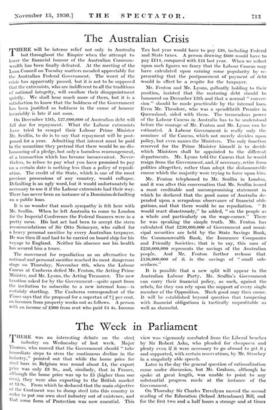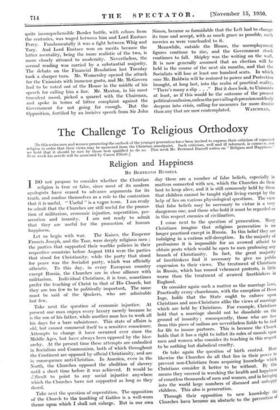The Week in Parliament
THERE was an interesting debate on the steel -I-- industry on Wednesday of last week. Major Thomas, who moved that the Government should " take immediate steps to stem the continuous decline in the industry," pointed out that while the home price for steel bars in Belgium was round about £4, the export price was only £3 9s., and, similarly, that in France, although the home price was up to £5 (higher than our own), they were also exporting to the British market at £3 9s. From which he deduced that the main objective of the Continent was to dump steel into this country in order to put our own steel industry out of existence, and that some form of Protection was now essential. This
view was vigorously combated from the Liberal benches by Sir Robert Aske, who pleaded for cheapnes's and plenty even if it were necessary to go abroad to get it ; and supported, with certain reservations, by Mr. Strachey in a singularly able speech.
Later in the day the general question of rationalization came under discussion, but Mr. Graham, although he spoke at great length, was unable to point to any substantial progress made at the instance of the Government.
On Thursday Sir Charles Trevelyan moved the second reading of the Education (School Attendance) Bill, and for 'the first two and a half hotirs a strange and at times
quite incomprehensible Border battle, with echoes from the centuries, was waged between him and Lord Eustace Percy. Fundamentally it was a fight between Whig and Tory. And Lord Eustace won on merits because the latter mentality, being the more realistic of the two, is more closely attuned to modernity. Nevertheless, the second reading was carried by a substantial majority. The debate on the Financial Resolution last Tuesday took a sharper turn. Mr. Womersley opened the attack for the Unionists with immense gusto, and Mr. McGovern had to be voted out of the House in the middle of his speech for calling him a liar. Mr. Maxton, in his most truculent mood, picked a quarrel with the Chairman, and spoke in terms of bitter complaint against the Government for not going far enough. 'But the Opposition, fortified by an incisive speech from Sir John Simon, became so formidable that the Left had to change its tune and accept, with as much grace as possible, such mercies as were vouchsafed to it.
Meanwhile, outside the House, the unemployment figures continue to rise, and the Government stock continues to fall. Shipley was the writing on the wall: It is now generally assumed that an election will be held in the course of the next six months, and that the Socialists will lose at least one hundred seats. In which case Mr. Baldwin will be restored to power and Protection brought, at long last, into the realm of practical reality. " There's many a slip . . ." But it does look, to Unionists at least, as if this would be the outcome of the present political confusion,unless the preVailing depression suddenly deepens into crisis, calling for measures far more drastic
than any that are now contemplated. WATCHMAN,









































 Previous page
Previous page